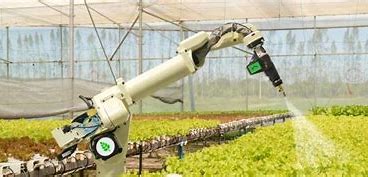In recent years, the agricultural industry has witnessed a significant transformation with the integration of artificial intelligence (AI) technologies. AI has the potential to revolutionize the way we approach farming, leading to increased productivity, reduced costs, and more sustainable practices. By leveraging AI algorithms and machine learning, farmers can make more informed decisions, optimize resource allocation, and improve overall agricultural productivity. In this article, we will explore some key ways to implement AI in agriculture for increased productivity.
Precision Farming:
Precision farming is an approach that utilizes AI and machine learning to analyze various data sources, including satellite imagery, weather patterns, soil conditions, and crop characteristics. By combining these data sets, farmers can make precise decisions about irrigation, fertilization, and pest control. AI algorithms can analyze the data in real-time, identify patterns, and provide actionable insights to optimize crop management. This targeted approach minimizes resource waste, improves crop yields, and reduces environmental impact.
Crop Monitoring and Disease Detection:
AI-powered systems can monitor crops using remote sensing technologies, such as drones and satellites. These systems capture high-resolution images and use computer vision algorithms to detect early signs of crop diseases, nutrient deficiencies, or pest infestations. By identifying potential issues at an early stage, farmers can take immediate corrective measures, preventing the spread of diseases and minimizing crop losses. AI also enables continuous monitoring, ensuring that any changes or anomalies are detected promptly.
Yield Prediction and Harvest Planning:
AI algorithms can analyze historical data, such as weather patterns, soil conditions, and previous yields, to predict future crop yields. By understanding yield expectations, farmers can optimize their planting and harvesting schedules, manage labor and equipment resources efficiently, and plan for storage and distribution logistics. Accurate yield predictions facilitate better decision-making, reduce waste, and improve overall profitability.
Autonomous Farming:
The rise of robotics and autonomous vehicles has opened up new possibilities for agriculture. AI-powered robots and drones can perform various tasks autonomously, such as seeding, weeding, and harvesting. These machines are equipped with sensors and cameras that collect data about plant health, growth patterns, and weed presence. By using machine learning, the robots can adapt and optimize their actions based on the collected data. Autonomous farming reduces labor costs, increases efficiency, and allows for 24/7 monitoring and operations.
Supply Chain Optimization:
AI can play a crucial role in optimizing the agricultural supply chain, from farm to consumer. By analyzing data on market demand, transportation logistics, and inventory levels, AI algorithms can optimize the distribution of agricultural products. This ensures that products reach the market at the right time, in the right quantities, and at competitive prices. By reducing waste and improving efficiency in the supply chain, AI enhances profitability for farmers and ensures consumers have access to fresh and affordable produce.
Water and Resource Management:
Water scarcity is a significant challenge in agriculture, and AI can help address this issue. AI algorithms can analyze data from soil sensors, weather forecasts, and crop water requirements to optimize irrigation systems. By delivering the right amount of water at the right time and in the right place, farmers can conserve water resources and reduce irrigation costs. AI can also optimize the use of other resources, such as fertilizers and pesticides, minimizing waste and environmental impact.
In conclusion, the implementation of AI in agriculture offers tremendous potential for increased productivity and sustainability. By leveraging AI algorithms and machine learning, farmers can make data-driven decisions, optimize resource allocation, and improve overall crop management. From precision farming and crop monitoring to autonomous farming and supply chain optimization, AI is transforming the agricultural landscape. As technology continues to advance, it is essential for farmers to embrace AI and leverage its capabilities to unlock the full potential of modern agriculture.



